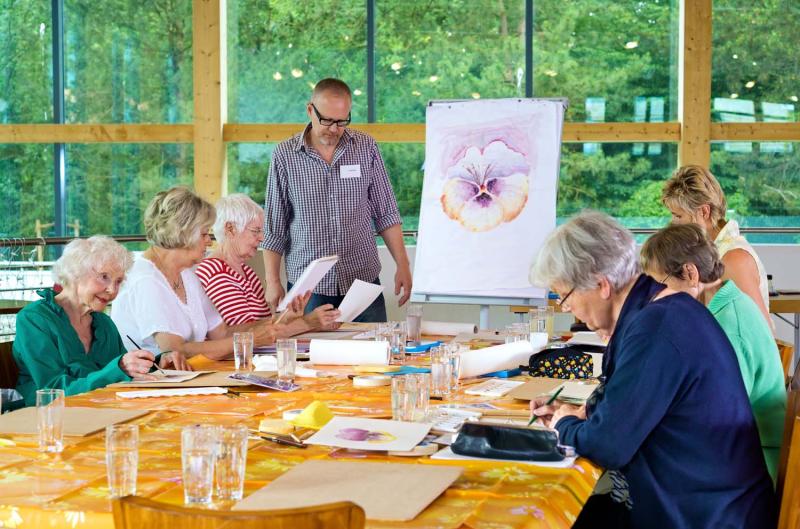Key points
- The delivery of person-centred care is dependent on understanding the individual as a person with a past, present, and future.
- Tailored activities were found to benefit residents of aged care, regardless of their cognitive abilities, by improving quality of life.
- The person-centred qualities of music therapy, life review, and reminiscence therapy may be behind the success of these activities in improving the wellbeing of aged care residents living with dementia.
The Royal Aged Care Commission called for aged care workers to embed a person-centred approach into their care. [1] Person-centred approaches focus on the care needs and preferences of the individual person, rather than their disease or diagnosis. [2, 3] Services that follow this approach provide care that considers the personal preferences of the individual and their activities and interests prior to requiring aged care. [4] For person-centred care to be successful, it requires ongoing conversations between service users, families, carers, and professionals, particularly occupational therapists. This ensures the focus of care remains directed towards agreed goals. [2]
This evidence theme is a summary of one of the key topics identified by a scoping review of meaningful lifestyle activities.
The review identified that most of the evidence available was specific to aged care residents with dementia. However, regardless of cognition, aged care residents were found to benefit from and enjoy activities tailored to their individual preferences. [5]
Aged care users are people with a past, present and future
The review identified that occupational therapy’s approach to person-centred care is to understand the individual ‘as a person with a past, present, and future.’ [6] This provides the opportunity for aged care users to maintain their identity. It may also assist professionals and carers to integrate the individual’s interests into daily routines. To integrate meaningful activities into aged care, professionals and carers need to have a deep understanding of their clients as individuals. Activities that are related to residents’ individual values, unique past life experiences, life roles and routines, and appeals to their sense of adventure or growth are more meaningful, motivating, and pleasurable.’ [6] This can facilitate the adaptation and tailoring of activities, within the context of the environment. These principles are demonstrated by a variety of aged care workers such as carers and lifestyle coordinators, however, evidence to support person-centred care was not found.
Person-centred care for people with dementia
For individuals living with dementia, person-centred care should focus on their personal preferences and previous life experiences rather than their diagnosis. [6] Providing personally tailored activities and person-centred care for older adults with dementia has been found to:
- Improve expression of behaviours of concern, although the effects were small, and research was generally of low quality. [7]
- Reduce agitation, neuropsychiatric symptoms, and depression. However, the reduction in agitation with person-centred care interventions was short-term. [8]
- Enhance quality of life (dependent on suitable education of care staff). [8]
Transition care providers are recommended to apply a person-centred care approach for home care to maintain meaningful activities. This requires continual evaluation of the individual’s interests, abilities (both cognitive and physical), personal preferences and a deep understanding of their life story. [9]
Specific activities shown to be particularly useful to improve the wellbeing of older adults with dementia were:
- Music therapy
- Life review and reminiscence therapy. [5, 10]
- In contrast, the evidence supporting staff training to develop individual care plans was of low quality and evidence for animal-assisted therapy was inconclusive. [10]
- Take the time to understand the past interests and activities that the older person enjoyed and continues to enjoy and consider how the older person’s present abilities might allow them to continue to participate in meaningful activities.
- Consider the support someone might require to continue participating in an activity they find meaningful and seek to find or provide that support.
- Encourage staff to get to know the individuals using aged care services and provide opportunities, support, and environments that promote autonomous decision-making and participation in meaningful lifestyle activities
- Provide guidelines, support, and education for staff to deliver person-centred care in the form of meaningful activities to aged care users.
- Encourage all aged care workers to use a person-centred approach to promote engagement in meaningful lifestyle activities.
This evidence theme has been informed by the results of a rapid scoping review intended to map the current published research in this area. We acknowledge that our findings reflect only the limited evidence available concerning the concept of ‘meaningful’ physical activities. Furthermore, our Evidence Advisory Group (EAG) and practice professionals suggest this evidence may not adequately reflect the understanding and practical implementation of meaningful lifestyle activities in aged care.
- Royal Commission into Aged Care Quality and Safety. Final report: Care, Dignity and Respect. 2021. [cited 2022 Sep 25]. Available from https://agedcare.royalcommission.gov.au/publications/final-report
- Coulter A, Oldham J. Person-centred care: What is it and how do we get there? Future Hosp J. 2016;3(2):114-6.
- Gordon S, Burns R, Champion S, Niutta L, Bennett P. Compassion and person‐centred care: Survey development for aged care workers. Australas J Ageing. 2022;41(2):e140-e50.
- Australian Commission on Safety and Quality in Health Care. Person-centred care [Internet]. ACSQHC; 2022. Available from: https://www.safetyandquality.gov.au/our-work/partnering-consumers/person-centred-care
- Shryock SK, Meeks S. Activity, activity personalization, and well-being in nursing home residents with and without cognitive impairment: An integrative review. Clin Gerontol. 2020:1-15.
- Du Toit SHJ, Shen X, McGrath M. Meaningful engagement and person-centered residential dementia care: A critical interpretive synthesis. Scand J Occup Ther. 2019;26(5):343-55.
- Mohler R, Renom A, Renom H, Meyer G. Personally tailored activities for improving psychosocial outcomes for people with dementia in long-term care. Cochrane Database Syst Rev. 2018;2:CD009812.
- Kim SK, Park M. Effectiveness of person-centered care on people with dementia: A systematic review and meta-analysis. Clin Interv Aging. 2017;12:381-97.
- Groenendaal M, Smaling HJA, Achterberg WP, Caljouw MAA. Maintaining meaningful activities for persons with dementia during transitions of care: A systematic review. Geriatr Nurs. 2022;44:176-83.
- Travers C, Brooks D, Hines S, O'Reilly M, McMaster M, He W, et al. Effectiveness of meaningful occupation interventions for people living with dementia in residential aged care: A systematic review. JBI Database System Rev Implement Rep. 2016;14(12):163-225.
Connect to PubMed evidence
This PubMed topic search is limited to home care and residential aged care settings. You can choose to view all citations or citations to articles available free of charge.


